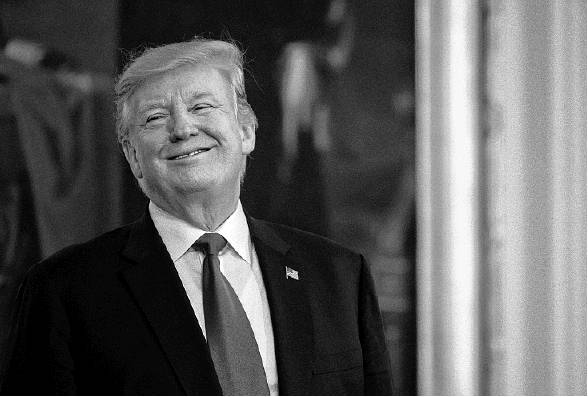No traitor, no loyalty
Report lacks smoking gun but shows Trump is willing to put America’s needs behind his own.
Twenty years ago last summer, Americans reacted with disgust at sordid revelations contained in the report of independent counsel Ken Starr’s investigation into the conduct of President Bill Clinton during his affair with a White House intern and his attempts to cover it up.
Many worried the presidency had been forever diminished. This newspaper’s editorial board concluded that whatever the outcome of impending impeachment proceedings, Clinton had “disgraced himself and his office.”
Thursday’s release of special counsel Robert Mueller’s report is no less depressing a milestone in the history of the American presidency. Understanding why won’t be easy. Thursday’s announcement and the immediate hyperpartisan spin from all sides offered little consolation to the average American looking for some measure of truth not filtered through prisms of political advantage.
In the end, Mueller’s report delivers. The truth is there for anyone willing to search it out amid the nuance.
Attorney General William Barr’s redacted version is pocked with a distressing tally of bad behavior by Trump as both candidate and president, and includes a litany of lies, crimes and other misdeeds by his aides that should nauseate readers.
Mueller spent nearly two years to determine whether Trump or his aides “illegally coordinated” with Russia in its cyberattack on the 2016 American presidential election. The report explains for the first time what evidence led Mueller to stop short of exonerating Trump on criminal allegations that he tried to obstruct the Russia investigation.
It also revealed some mischaracterizations on the part of Barr, who has attempted for weeks to shield the White House from the more damning findings. His four-page summary to Congress in March stated unequivocally that Mueller had concluded Trump was not guilty of “colluding” with Russia. That turns out to have been only partly true.
Mueller explains that “collusion” is not defined in federal criminal statutes. Instead, he sought evidence Trump or his aides had participated in a conspiracy with Russia to affect the outcome of the election. Mueller found no evidence that team Trump had “conspired and coordinated with” Russians as part of their enormous efforts to defeat Hillary Clinton. Therefore, he concludes, no one was guilty of the crime of illegal coordination.
But he’s just as clear that Trump and his aides met time and again with Russians eager to help Trump win, even if Trump’s camp didn’t ultimately join forces with them. Mueller concluded that there is no evidence Trump and his team knew they were being used by the Russians, even if they sometimes unwittingly furthered the cause — as when Kellyanne Conway, Donald Trump Jr. and Trump himself all retweeted information from individuals working for Russia.
In still other cases, top campaign officials did know Russia was trying to help, but there is no evidence that they initiated these efforts. In the now-infamous meeting at Trump Tower, which included Trump’s campaign chairman, his son and his son-in-law, the Trump team had been promised damaging information from the Russians — who then then failed to deliver it.
Days later, when WikiLeaks released thousands of emails hacked from the Democrats’ computers, WikiLeaks didn’t reveal that the data had come from a unit set up by Russia to infiltrate Trump’s opponents’ computers. Nor was there proof that the Russians had given the information to Wikileaks at the behest of the Trump campaign.
There are many examples of these kinds of events in Mueller’s report. He may be legally correct that they do not amount to proof that Trump or his team are guilty of criminally betraying their country. But who could call such cavorting with an adversarial foreign power innocent or patriotic?
Mueller’s findings are no less distressing on a second question: whether Trump obstructed justice in trying to stymie the Russia investigation.
Trump is revealed to have repeatedly attempted to control the outcome of the investigation, first by asking FBI Director James Comey to spare disgraced national security adviser Michael Flynn — to “let Flynn go,” in Trump’s words — and later on, after it became clear that Trump was being investigated, to inveigh ceaselessly against the inquiry itself, against Mueller, and against any aide who might testify.
This deeply disturbing conduct, on its face signaling obstruction, wasn’t enough to warrant criminal charges, Mueller decided, in part because he wasn’t sure he could prove Trump acted with “corrupt intent.”
Barr quickly seized on that indecision and made his own determination in March that no criminal obstruction had occurred. He repeated Thursday that Trump had been exonerated on that point, too.
That’s absurd. Iffy evidence for a criminal charge is one thing. Common sense leaves no doubt that Trump tried to impede the investigation.
The report has dealt America a dilemma: It is not an exoneration of Trump, nor is it the smoking gun that would give impeachment proceedings bipartisan validity.
The report shatters the most damning accusation against the president: Trump is not, in fact, a traitor under the law, according to Mueller’s findings. But the report stacks brick upon brick of examples that substantiate another well-known case against the president: He is an opportunist and a bully willing to put America’s interests second to his own.
For some, no revelations there. For others, we hope this report provides the nudge — or the swift kick — needed for American voters to hold Trump accountable in November 2020 for his disastrous leadership.
